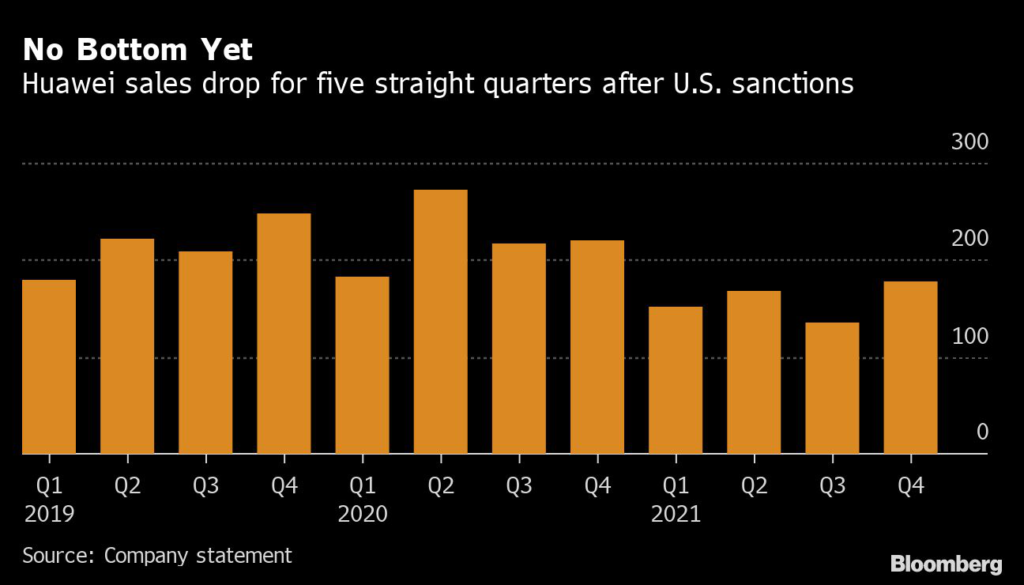(Bloomberg) — Chinese smartphone maker Honor Device Co. is seeking to raise expansion capital ahead of an initial public offering as early as this year, people familiar with the matter said.
The former Huawei Technologies Co. arm is in talks with investors about a pre-IPO round of financing, according to the people, who asked not to be named as the plans aren’t public. It wanted to bring in foreign funding to burnish its image as an international company while distancing itself from Huawei and the risk of China-related sanctions. But overseas investors balked at Honor’s asking valuation of more than $45 billion and remain wary about future U.S. restrictions, the people said.
Honor needs a capital injection to beef up its domestic retail and e-commerce operations as well as build out a global presence. It’s likely to opt for a domestic listing in China, one of the people said, though a final decision hasn’t yet been reached and a dual listing remains an option, the people added. It’s unclear if Honor will ultimately snag funding at its intended valuation, which surpasses peers such as Xiaomi Corp.
Huawei sold Shenzhen-based Honor to a Chinese state company-led consortium in 2020, sidestepping crippling U.S. sanctions that derailed the parent’s mobile business. The budget phone brand has since gained headway, ranking second in Chinese smartphone shipments behind only Apple Inc. in the last quarter of 2021.
Read more: Huawei Sells Budget Phone Brand After U.S. Cuts Chip Supply
Huawei didn’t disclose the size of the deal at the time of the spinoff, though it reported more than 60 billion yuan ($9.2 billion) as income unrelated to its core businesses in its most recent annual report.
As a standalone firm, Honor wasn’t subject to the same trade restrictions and retained access to American technology and software essential to producing the most advanced consumer electronics.
Honor said the spinoff allowed it to trade freely with U.S. component suppliers like Qualcomm Inc., whose Snapdragon chipsets power most of the world’s Android handsets. The brand more than tripled its domestic shipments at the end of last year, securing 17% of the world’s biggest smartphone market, according to research firm IDC.
In January, Honor added a subsidiary of state-owned broker CITIC Securities as its latest stakeholder. But when it held talks with several foreign funds earlier this year, the parties couldn’t come to an agreement on its prospects and valuation, the people said.
Honor declined to comment on its valuation, but said it’s recording “steady growth” in revenue, profit and operating cash flow. “Honor will continue to diversify our shareholding structure,” the company said in a statement. “Going public is just one of the viable options down the line.”
Global Smartphone Market Had Worst Drop Since Virus Outbreak
Its fundraising efforts have been made more difficult by a gloomy outlook for the global smartphone market.
The original valuation of Honor was pegged to competitor Xiaomi’s share price at the time of the spinoff, but the listed firm is now trading near a 12-month low at only a third of its 2021 peak following a tech selloff. Broadening 5G wireless adoption was widely expected to boost growth for smartphone makers, yet surging inflation, Russia’s invasion of Ukraine and China’s stringent Covid Zero policies have dampened demand and disrupted supply chains.
Honor executives, who were asked to buy the company’s shares at the beginning of the deal, found it challenging to bring in new investors at its current valuation, one of the people said.
A writedown in the valuation is not an option for Honor because of its heavy exposure to state-owned capital — local officials risk punishment from Beijing for any perceived failed investments. Shenzhen’s state asset management body injected more than 10 billion yuan into Honor following the spinoff, according to regulatory filings.
More stories like this are available on bloomberg.com
©2022 Bloomberg L.P.











